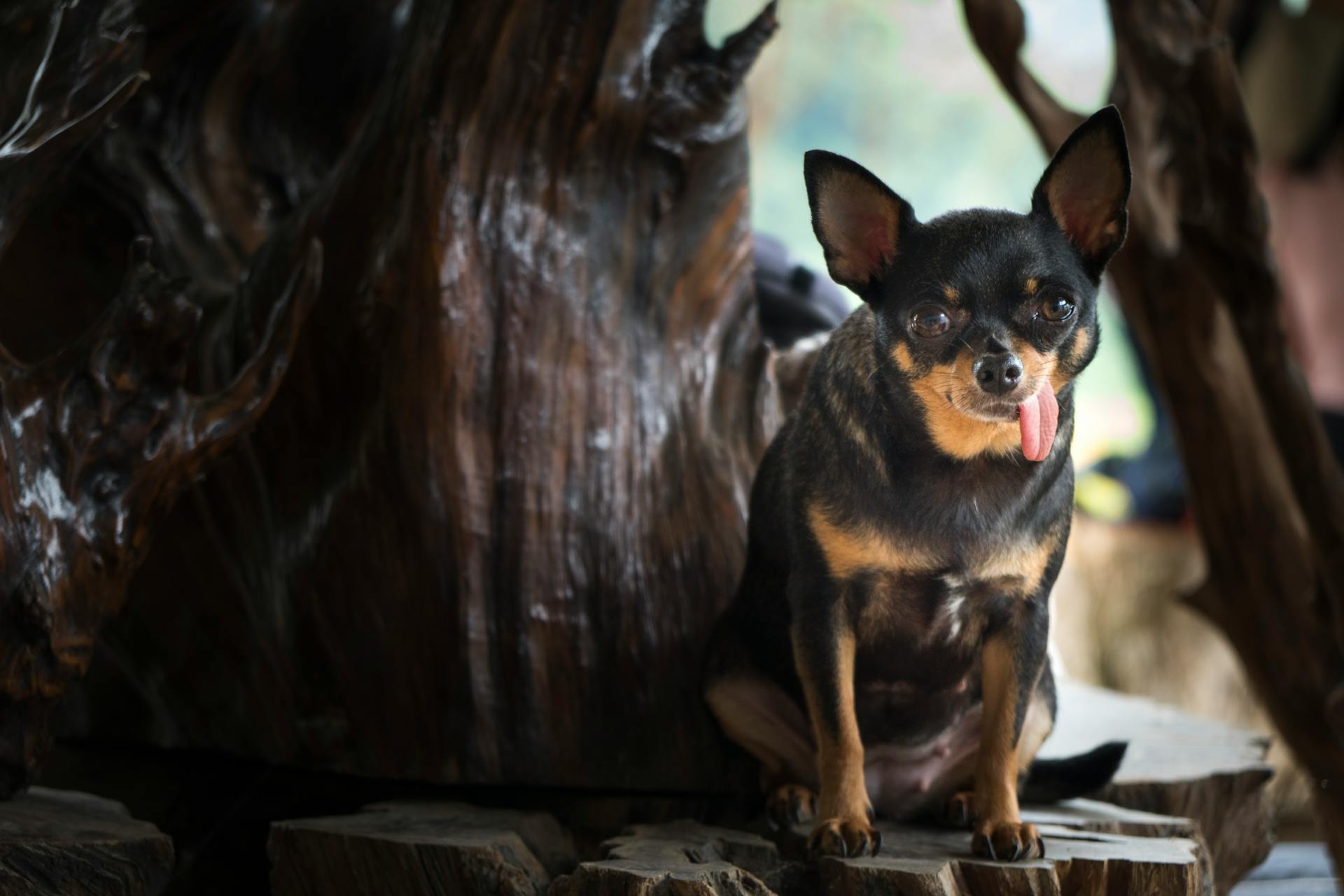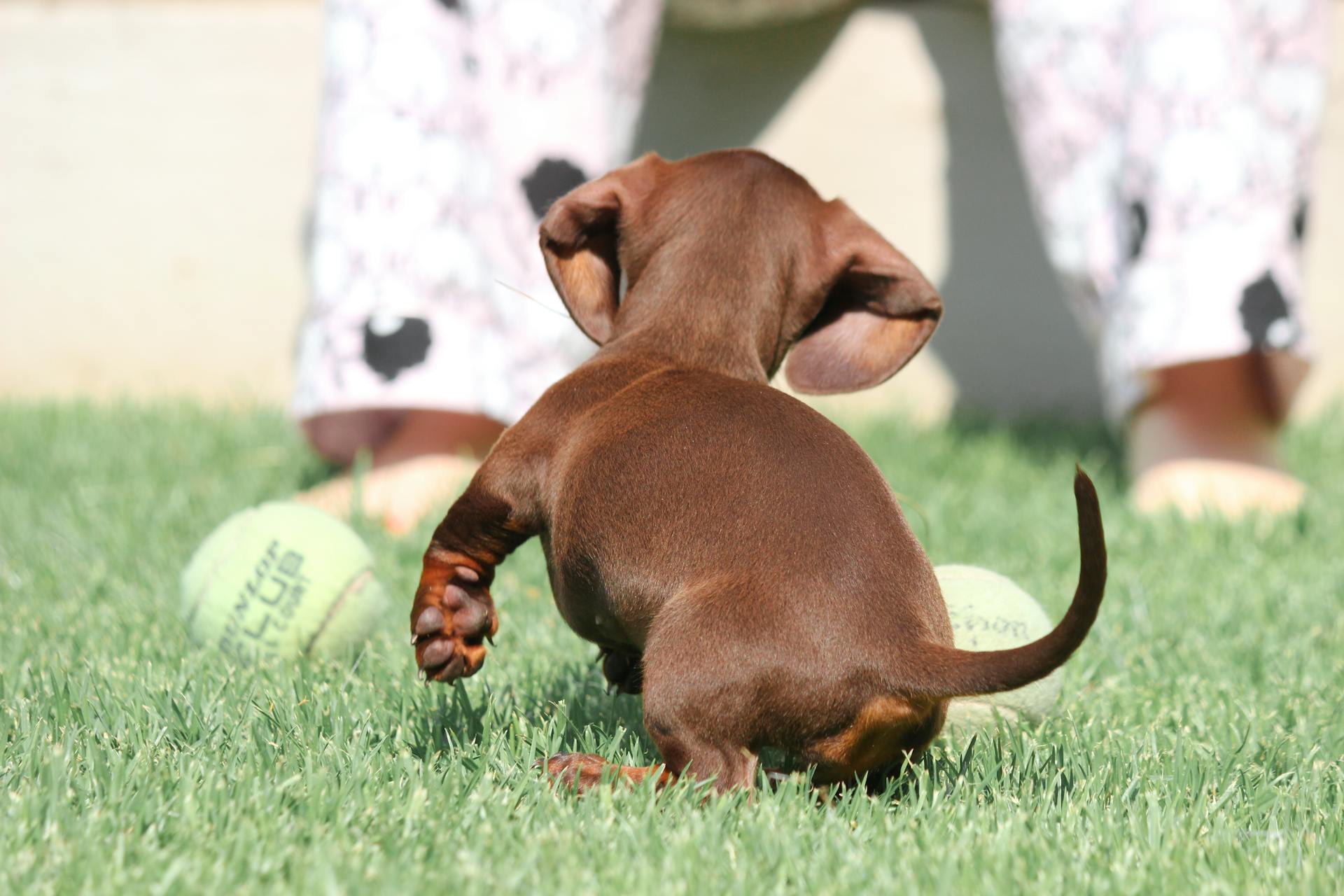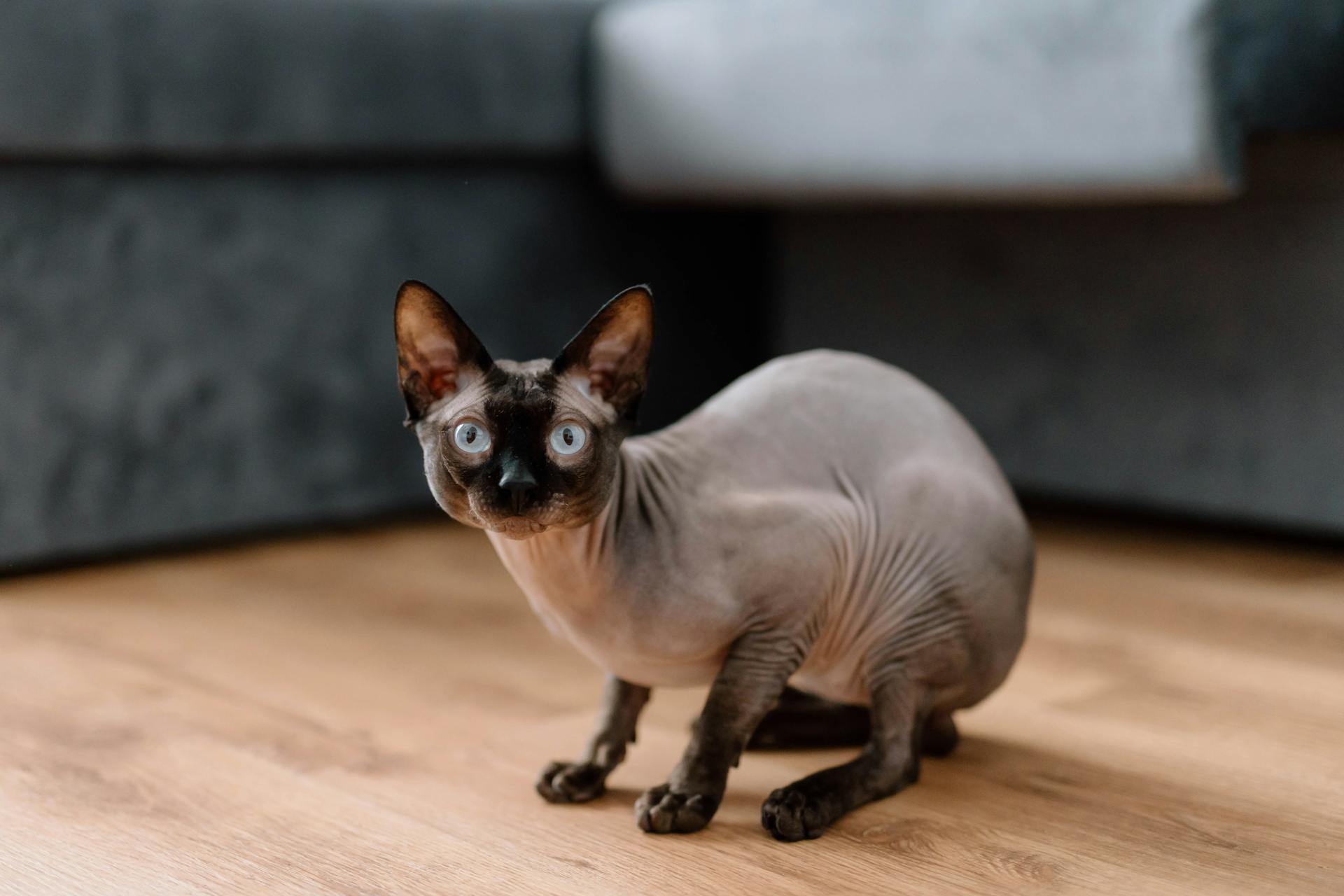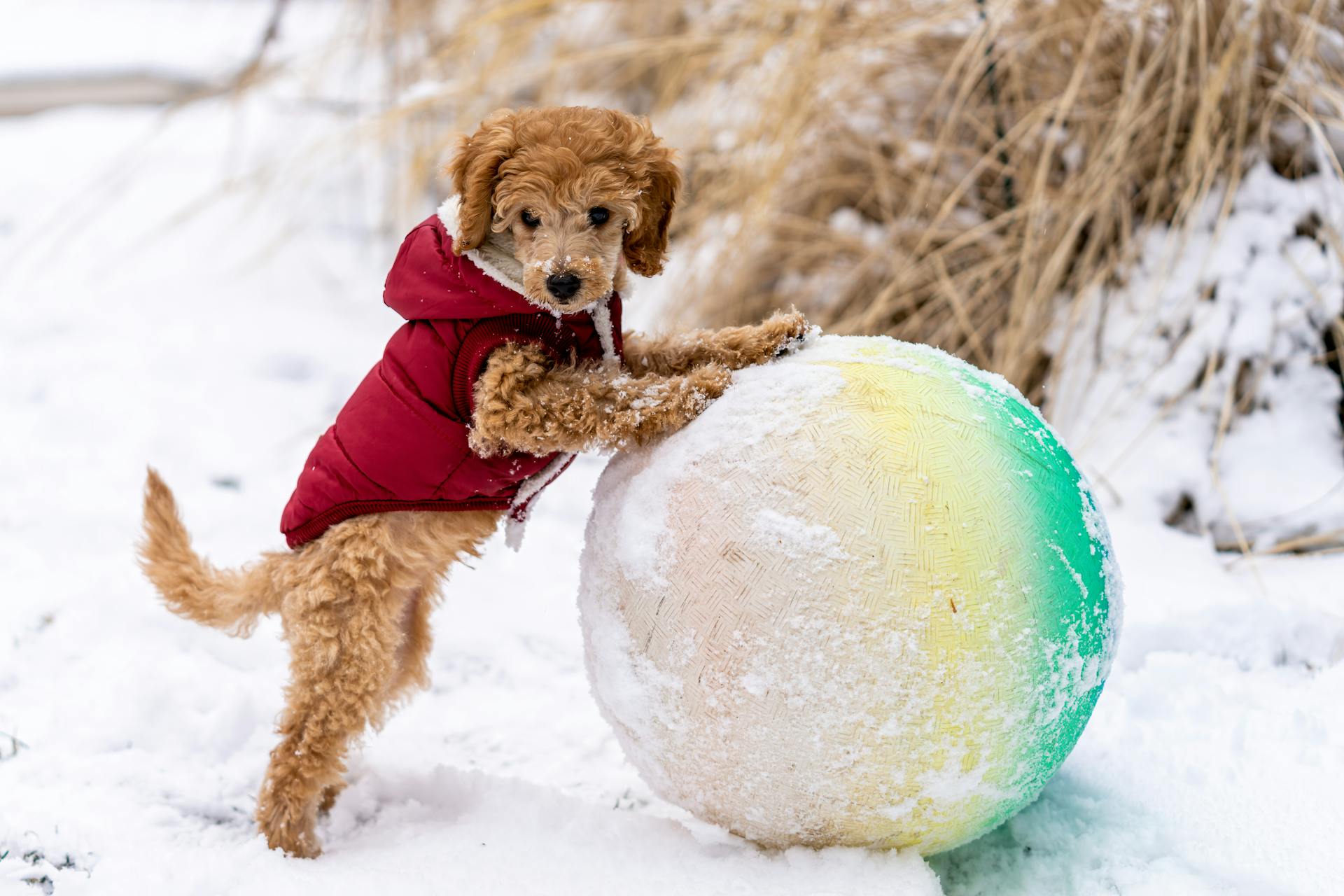
Toy poodles are small, but they have big appetites. They need to eat a high-quality dog food that's rich in protein and fat.
Toy poodles are prone to obesity, so it's essential to monitor their food intake and ensure they get regular exercise. A daily walk of at least 30 minutes is recommended.
Toy poodles have sensitive stomachs, so it's best to introduce new foods gradually to prevent digestive issues.
Feed your toy poodle 2-3 times a day to prevent gorging and maintain a healthy weight.
Feeding Basics
Treats should not make up more than 10% of your toy poodle's total caloric intake. Exceeding this limit can lead to weight gain and nutritional imbalances.
Treats are not a substitute for a balanced diet, so it's essential to keep them in moderation. Consider using smaller, low-calorie treats for training purposes.
You can even use a portion of your toy poodle's regular kibble as training treats to keep the caloric intake in check. This way, you can reward your dog without overfeeding.
Always consult your veterinarian if you're unsure about the type or amount of treats suitable for your pet.
You might like: Dog Training with Toys
Nutrition and Diet
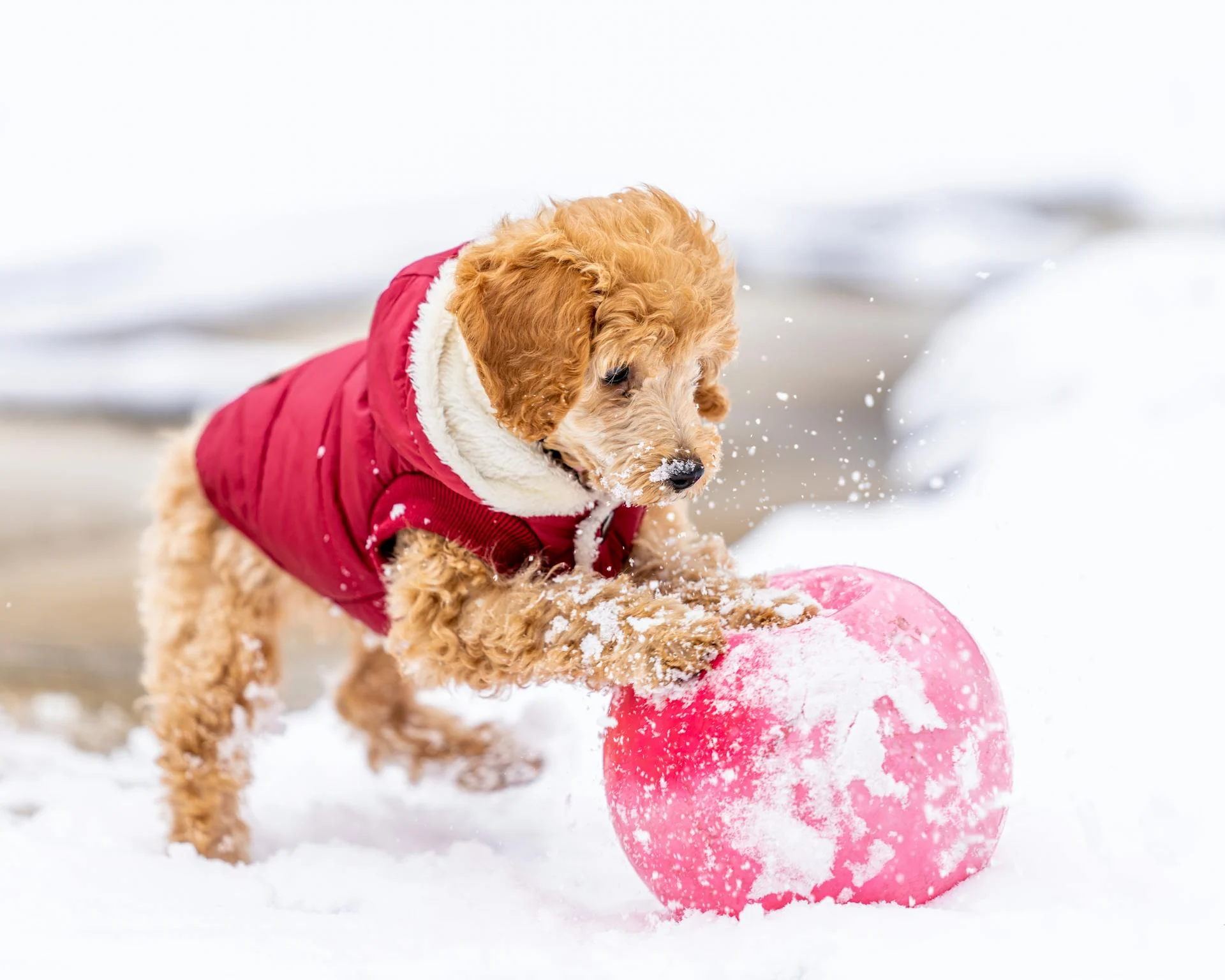
Feeding toy poodles requires careful consideration of their nutritional needs. A balanced diet rich in essential nutrients is vital for their growth and development.
Toy poodles need a variety of foods to ensure a well-rounded intake of nutrients, including dry food, wet food, and occasional home-cooked meals. However, it's essential to consult with a veterinarian before making any changes to their diet.
Puppies have specific nutritional requirements that support their rapid growth and development. Protein is crucial for muscle growth and repair, while fats provide energy and support cell function. Vitamins and minerals are necessary for various bodily functions, including bone growth and immune health.
Here are some key nutritional considerations for toy poodles:
- High protein content (especially in puppy food)
- Adequate calories to fuel high energy levels
- Essential fatty acids for a shiny coat and healthy skin
- Vitamins and minerals for bone growth and immune health
- Considerations for individual factors and conditions, such as allergies, sensitive stomachs, or weight gain
Monitoring your toy poodle's growth and health is crucial to ensure they're thriving. Regular weight checks and physical development assessments can help you identify any potential issues early on.
Nutritional Foundations
Providing a balanced diet rich in essential nutrients is vital for toy poodle puppies' growth and development.
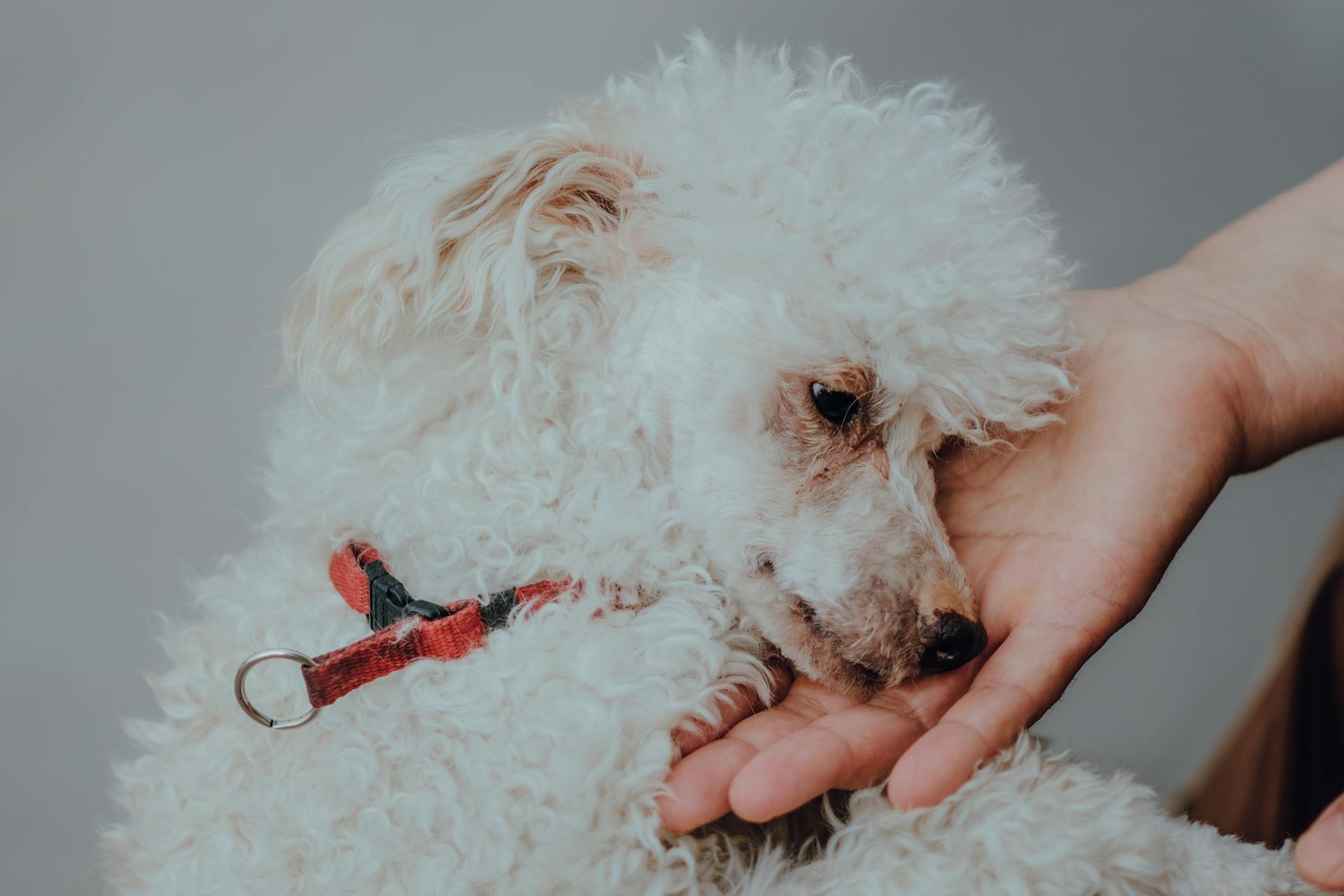
Toy poodle puppies need a lot of protein, especially when they're a puppy, to support muscle growth and repair. Adequate calories are also necessary to fuel their high energy levels.
A balanced diet involves a mix of puppy food designed for small breeds, which often comes in the form of kibble or wet food. Feeding toy poodle puppies several small meals throughout the day can support their metabolism.
Puppies typically require 3-4 small meals per day, but their exact needs can vary based on individual growth patterns. Guardians should track the puppy's weight gain and consult a veterinarian to confirm that growth is within the expected range.
Here's a quick guide to monitoring your toy poodle's growth and health:
- Body Condition: Check regularly. Puppies should not be obese or underweight.
- Health Indicators: Look for a shiny coat, energy levels, and good stool consistency.
Obesity in dogs can lead to a myriad of health problems, including diabetes, joint issues, and reduced lifespan. Toy poodles, especially those leading a sedentary lifestyle or those that are spayed/neutered, can be prone to weight gain.
Raw Diet
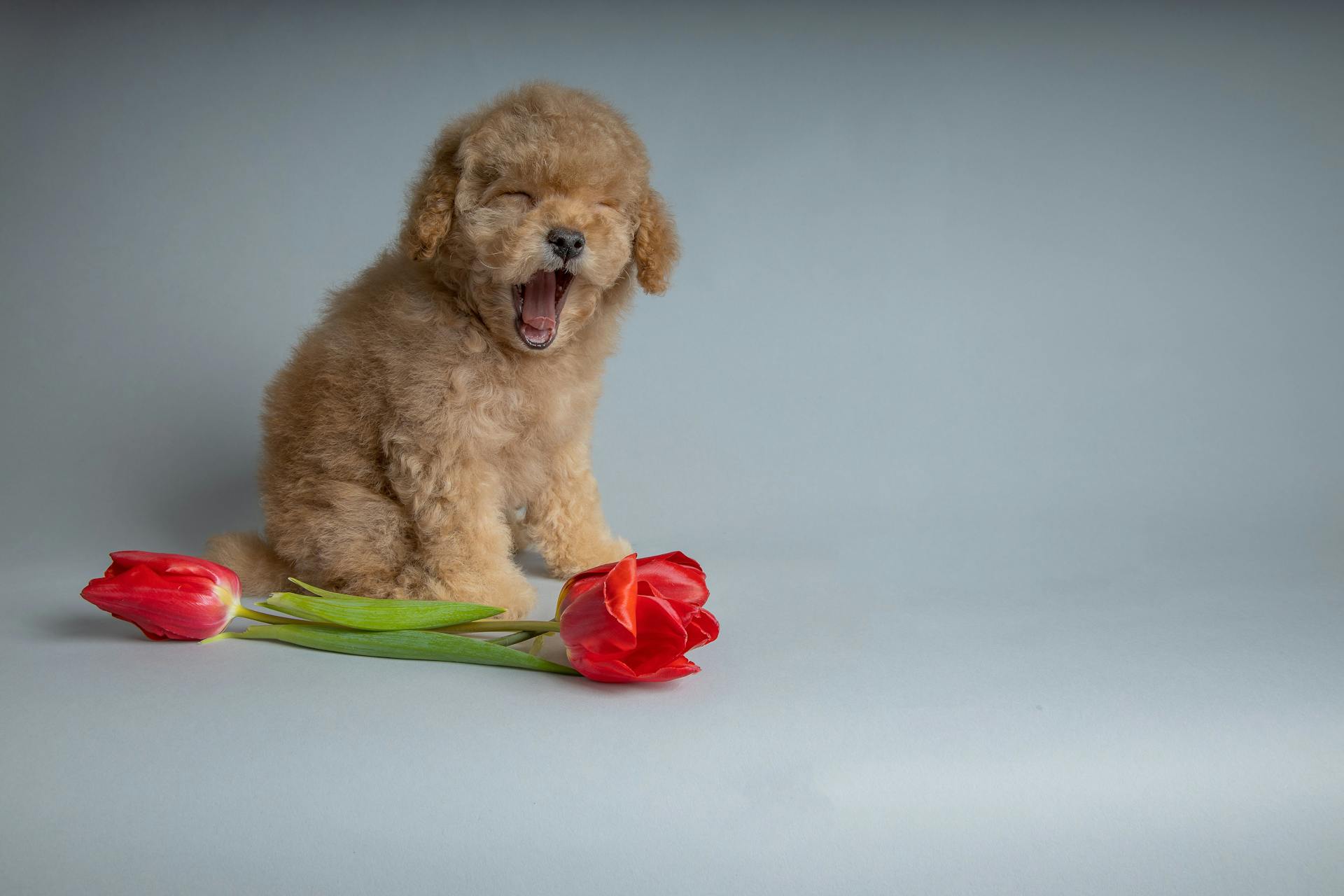
Feeding your toy poodle a raw diet can be a challenge. It didn't work out for me, and my pack of poodles had soft poops, even with added digestive enzymes and probiotics.
Toy poodles may not be able to digest large amounts of veggies, even in freeze-dried foods. They would poop out whole bits of undigested food, which is not only a waste of money but also irritating to their gut lining.
Raw diets can be time-consuming to prepare, and commercially prepared freeze-dried and air-dried foods are expensive. My dogs just didn't get their digestive systems right on these diets.
Toy poodles have tiny systems, and overfeeding rich foods can result in runny poops and upset digestive systems. Whole food freeze-dried treats can be a great option, but be careful not to overfeed them.
Discover more: What Not to Feed Chihuahuas
Feeding Schedule
Creating a consistent feeding schedule for your toy poodle is essential for their growth and well-being. It ensures they receive the right amount of nutrition based on their age, weight, and energy levels.
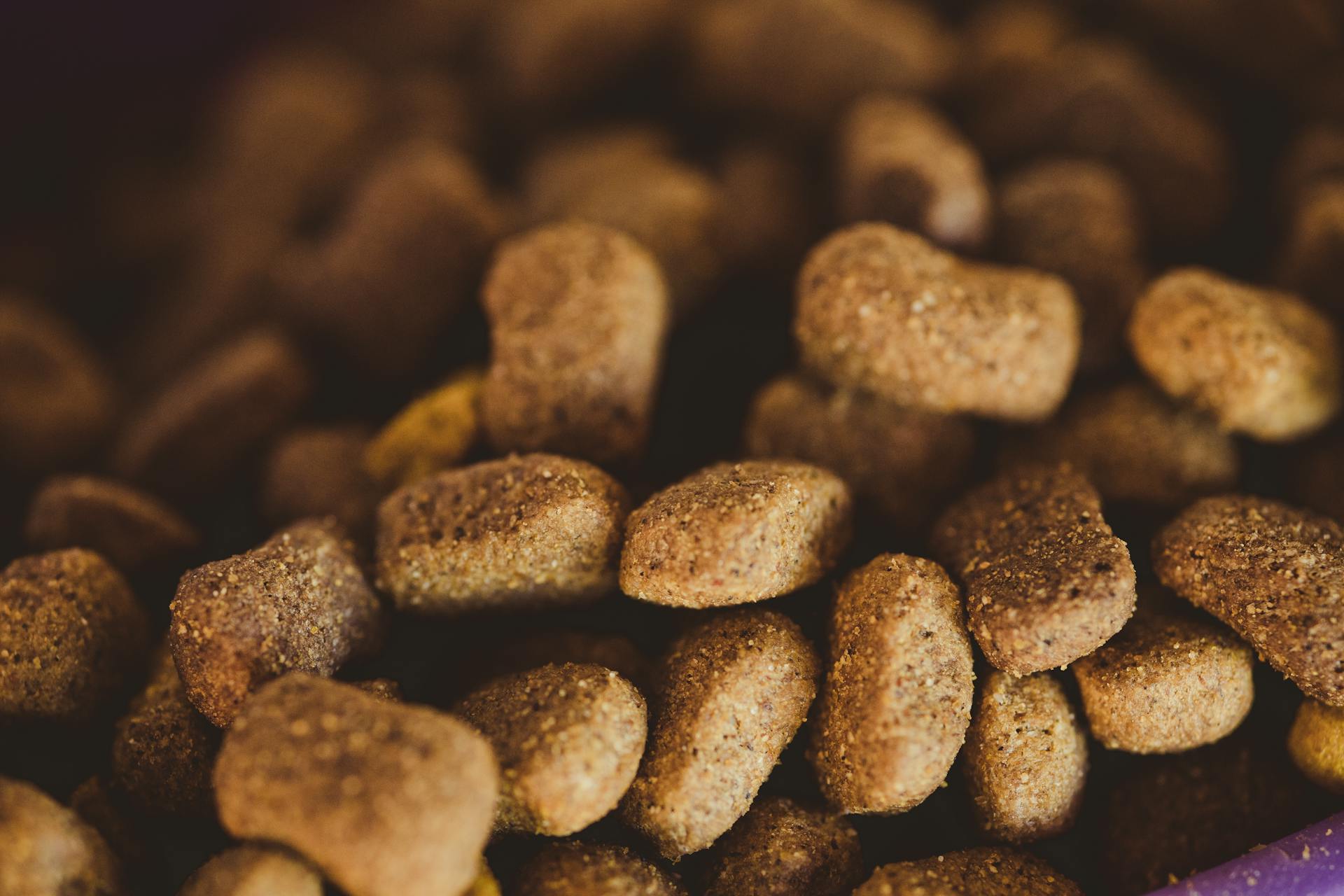
Toy poodle puppies benefit from being fed 3 to 4 times daily, while adult toy poodles flourish on a routine of twice-a-day feedings. This consistency is comforting for them and aids digestion.
Here's a feeding schedule guide for toy poodles based on age and weight:
Keep in mind that heavier puppies may require more food, so it's best to consult a poodle puppy feeding chart or your veterinarian for guidance.
How Much to Feed an Adult?
To determine how much to feed an adult toy poodle, first consider their typical weight range, which is between 3 to 6 kilograms.
Their diet should be adjusted according to this weight, taking into account their activity level, health conditions, and individual metabolic rate.
For a sedentary or less active toy poodle, the caloric requirement might be less compared to an active one that frequently engages in play or regular walks.
An average toy poodle, weighing about 4 kilograms and with a moderate activity level, might require approximately 150-200 calories per day.
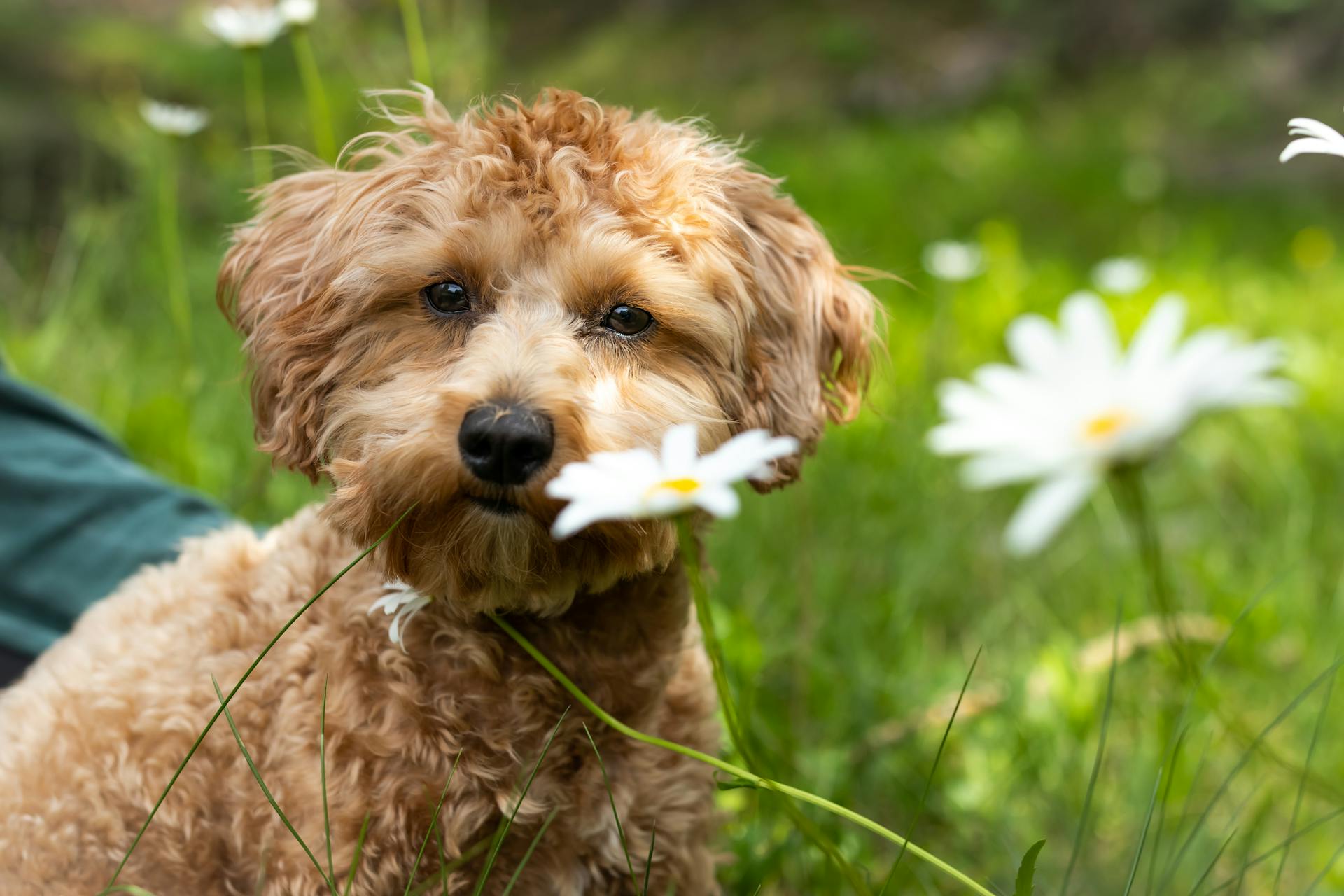
Always check the feeding recommendations on the dog food packaging, as different brands and formulations can vary in their caloric content.
Divide the food into two meals – breakfast and dinner – to aid in digestion and prevent overeating in one sitting.
Consistent feeding times not only establish a routine that your poodle can anticipate, but they also ensure that your dog’s energy levels remain stable throughout the day.
Periodic consultations with a veterinarian are invaluable, providing personalized recommendations based on your toy poodle’s health status and needs.
A fresh viewpoint: Standard Poodle Puppy Feeding Chart
Developing a Schedule
Creating a consistent feeding schedule for toy poodle puppies is essential for their growth and well-being. It ensures they receive the right amount of nutrition based on their age, weight, and energy levels.
Puppies under 3 months benefit from being fed multiple times throughout the day. You can start by feeding them 4 meals per day.
As they grow, the number of meals can decrease. For example, between 3-6 months, they can be fed 3 meals per day, and over 6 months, 2 meals per day.
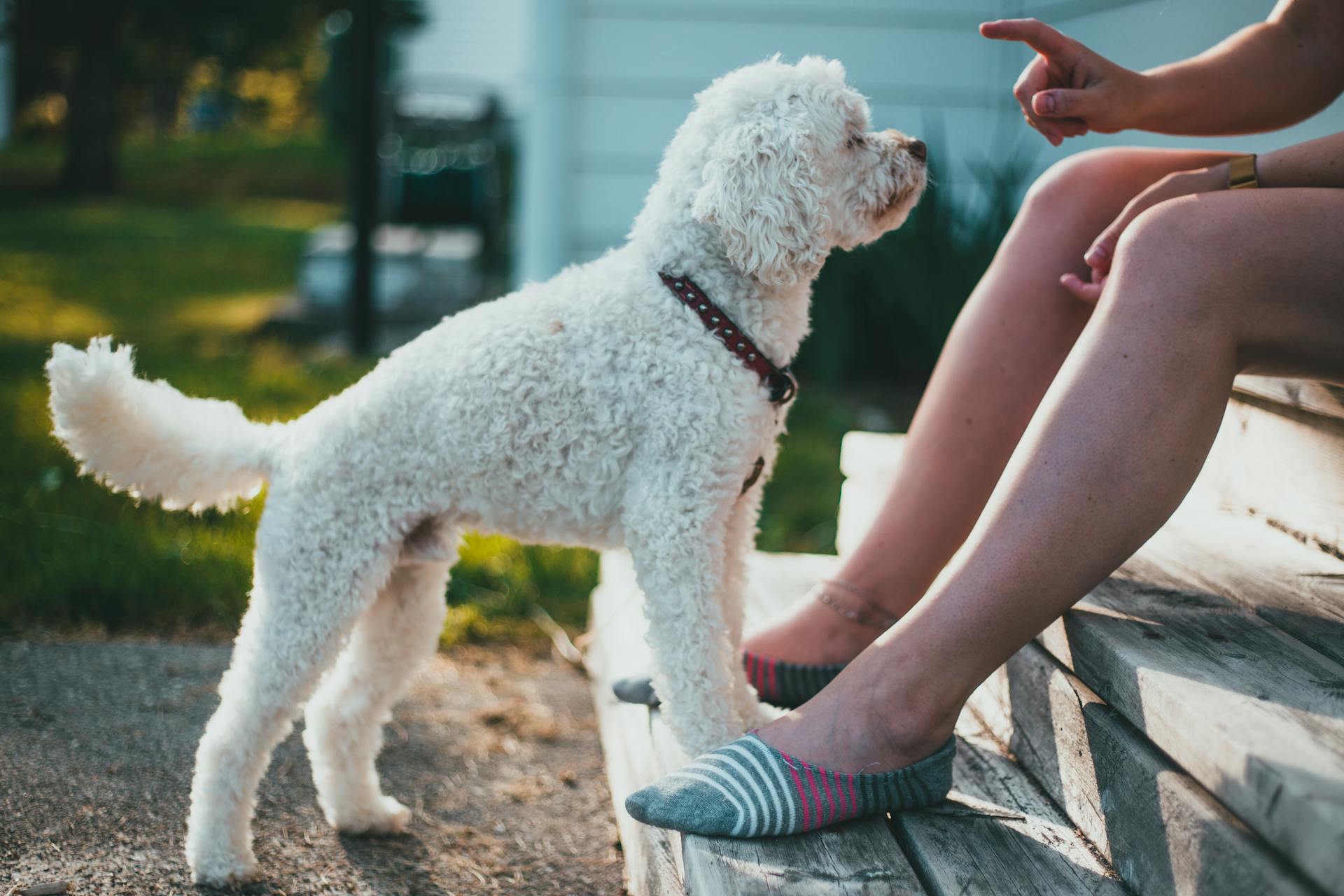
Heavier puppies may require more food, as per a poodle puppy feeding chart, which can usually be found on the dog food packaging or provided by your veterinarian.
A general guideline is to feed toy poodle puppies about 1/2 cup of food twice a day, but this can vary depending on their individual needs, activity level, and metabolism.
To add a little variety to their diet, you can mix in some human food that's healthy and full of vitamins and minerals, but be sure to consult with your vet for specific recommendations.
Feeding your toy poodle puppy at regular intervals, typically twice a day, helps regulate their metabolism and energy levels.
Nutrient and Health
Puppies have specific nutritional requirements that support their rapid growth and development.
Protein is crucial for muscle growth and repair, which is essential for a toy poodle puppy's high energy levels.
Adequate calories are needed to fuel a toy poodle puppy's high energy levels, but overfeeding can lead to obesity.
Vitamins and minerals are necessary for various bodily functions, including bone growth and immune health.
A balanced diet involves a mix of puppy food designed for small breeds, which often comes in the form of kibble or wet food.
It's generally advised that toy poodle puppies be fed several small meals throughout the day to support their metabolism.
Additional reading: Do Toy Poodles Stay Small
Special Considerations
Feeding your toy poodle requires special considerations, especially when it comes to allergies and sensitivities. Some toy poodles can develop allergies or sensitivities to certain foods, which can trigger reactions like itchy skin, digestive upset, and ear infections.
If you suspect your toy poodle has a food allergy, it's crucial to consult with a veterinarian, who may recommend an elimination diet to pinpoint the exact allergen. They can also suggest a diet formulated for easy digestion, with a limited ingredient list or specific fibers, to help soothe a sensitive stomach.
Toy poodles with dull coats or dry skin may benefit from foods rich in omega-3 and omega-6 fatty acids, found in fish oils, flaxseed, and other ingredients. Obesity in dogs can lead to health problems, so if your poodle is on the heavier side, consider switching to a weight management or light formula.
Dealing with Obesity
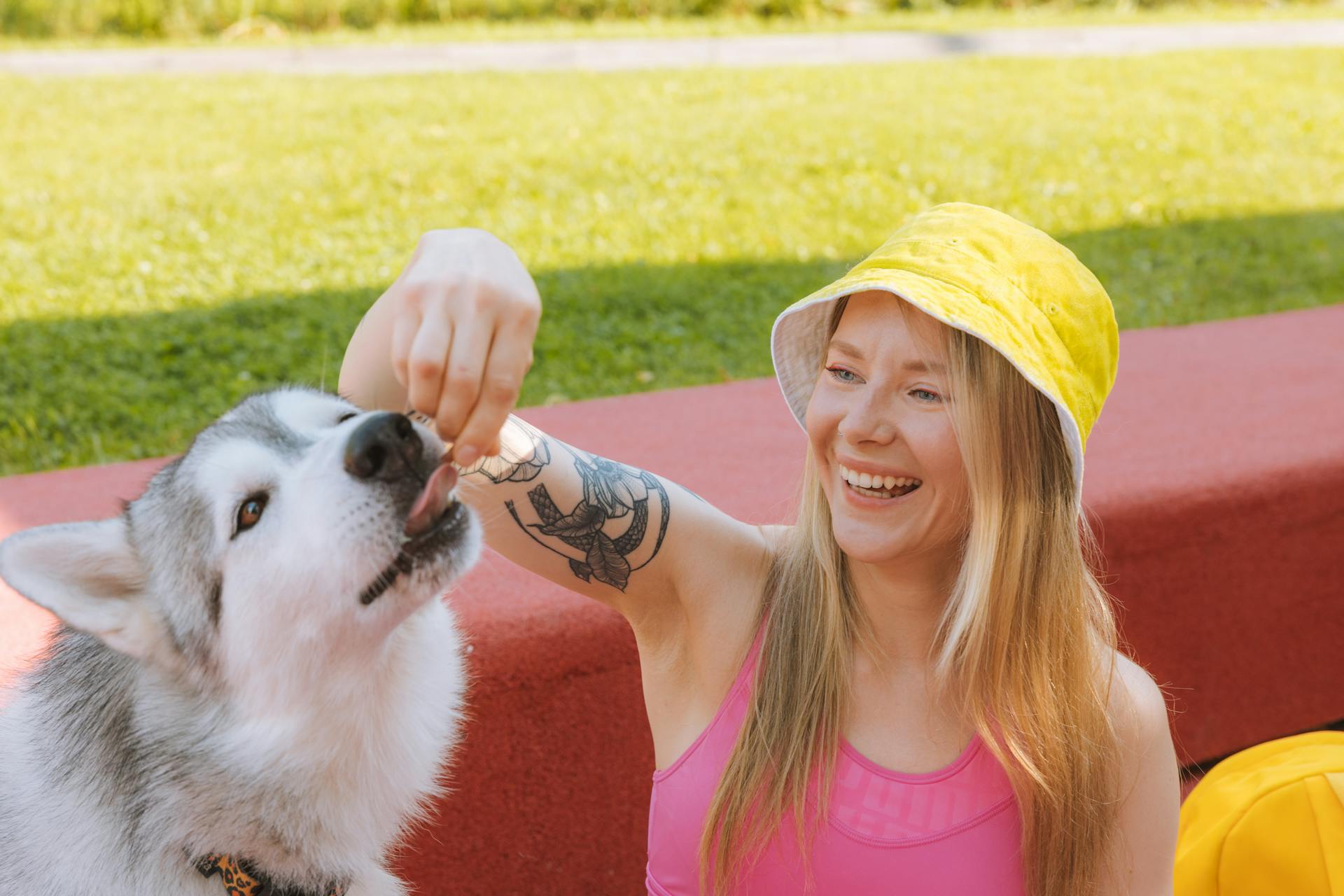
Overfeeding toy poodle puppies can lead to obesity, a serious health concern. Monitoring portion control strictly is crucial.
Toy poodle puppies need a gradual transition to adult food around 10 months of age to prevent digestive upset.
A vet-recommended feeding guide usually involves measured portions divided into two to three meals a day, which helps prevent weight gain.
Regular weigh-ins and body condition scoring can be used to adjust the diet as needed.
Here's a general guideline for suggested portions:
Toy poodle puppies need to be fed neither too little, nor too much, to avoid wastage or overfeeding.
How Often to Bathe a Dog
Bathing your dog regularly is important for their overall health and hygiene. Consistency is key, just like with feeding your toy poodle.
For toy poodles, a routine of twice-a-day feedings can start around the 10-month mark, and it's likely their baths will follow a similar schedule. Feeding them at regular intervals helps regulate their metabolism and energy levels.
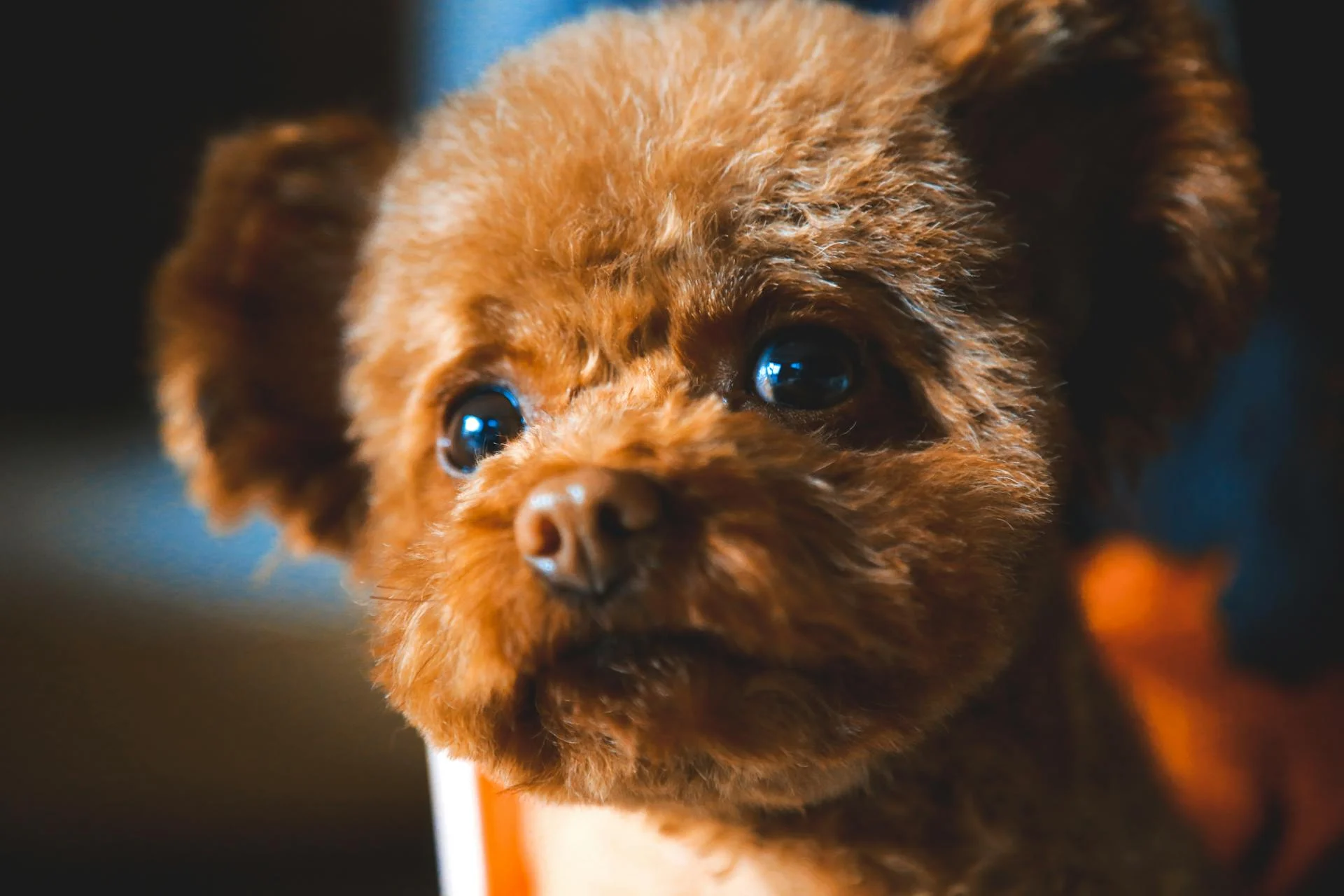
Regular consultations with your vet can provide guidance tailored to your dog's specific needs, just like they can with your poodle's feeding schedule. This is especially important if your dog has health issues that may affect their bathing needs.
Puppies benefit from being fed 3 to 4 times daily, and their baths should be adjusted accordingly. As they grow older, their bathing needs may change, just like their feeding schedule.
Safe Treats
When choosing treats for your toy poodle, it's essential to keep them healthy and safe. Treats should never make up more than 10% of the daily calorie intake.
Fresh vegetables like carrots or green beans are great options, but they should be given in moderation. I've seen some toy poodles get a bit too excited about veggies, so be sure to keep an eye on their intake.
Some protein-rich snacks, such as cooked chicken or salmon, are also safe and healthy choices. These can be a great way to add some variety to your poodle's diet.
Here are some safe treat options for toy poodles:
- Fresh vegetables like carrots or green beans
- Protein-rich snacks such as cooked chicken or salmon
Rawhide and cooked bones are not recommended due to choking hazards and potential digestion issues. Instead, you can offer safe chew toys or dental treats designed for small dogs to satisfy their chewing instincts.
Special Considerations
As a responsible toy poodle owner, it's essential to consider your dog's unique needs and health conditions to ensure they receive the right nutrition.
Some toy poodles may develop food allergies or sensitivities, which can cause itchy skin, digestive upset, and other symptoms. If you suspect your toy poodle has a food allergy, consult with a veterinarian who may recommend an elimination diet to pinpoint the exact allergen.
A toy poodle's luxurious coat requires certain nutrients, such as omega-3 and omega-6 fatty acids, found in fish oils, flaxseed, and other ingredients, to maintain its luster and health.
Toy poodles, especially those leading a sedentary lifestyle or those that are spayed/neutered, can be prone to weight gain, which can lead to various health problems, including diabetes, joint issues, and reduced lifespan.
Discover more: Health Issues with Toy Poodles
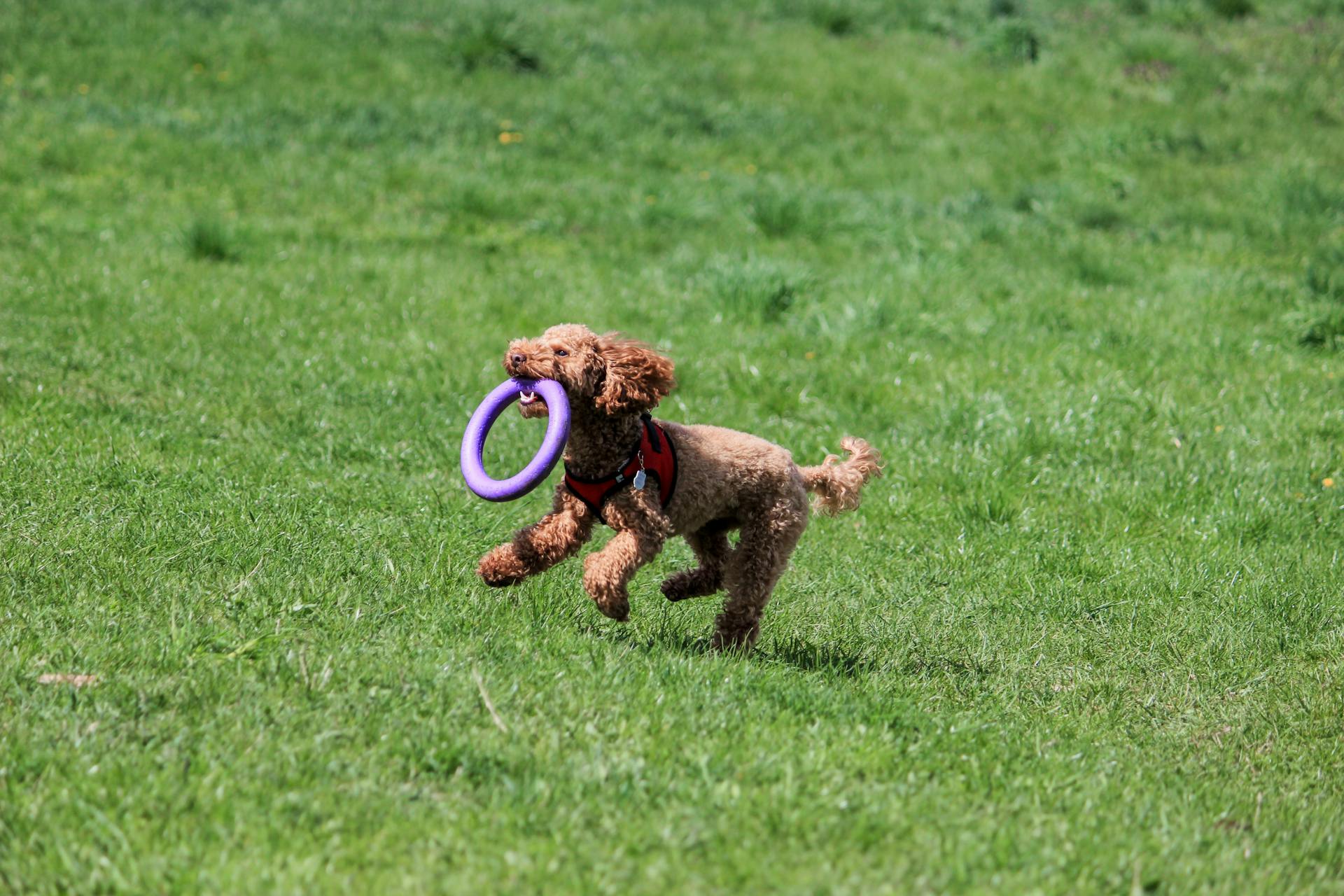
To monitor your toy poodle's health closely, regular vet check-ups are crucial. If you're ever in doubt about what kind of special diet your toy poodle might need, always seek expert advice from your veterinarian.
Here are some common special considerations for toy poodles:
- Food allergies or sensitivities
- Sensitive stomachs
- Weight gain
- Dull or dry coat
- Senior years (reduced calories and joint support)
- Diseases like diabetes, kidney or liver issues, or heart conditions
Remember, every toy poodle is unique, and their dietary needs may change over time. Always consult with your veterinarian to ensure your dog receives the right nutrition for their individual needs.
Behavioral Factors
Toy Poodles are highly active and intelligent dogs, and their eating habits often reflect this. They generally have a high activity level that influences their diet.
Their high energy levels mean they need a balanced and nutritious diet to keep them satisfied. You may have noticed that your Toy Poodle gets hangry if they don't eat on time.
Picky eating behaviors are common in Toy Poodles. They may need tailored food choices to ensure they're getting the nutrients they need. Understanding your individual Toy Poodle's preferences is key.
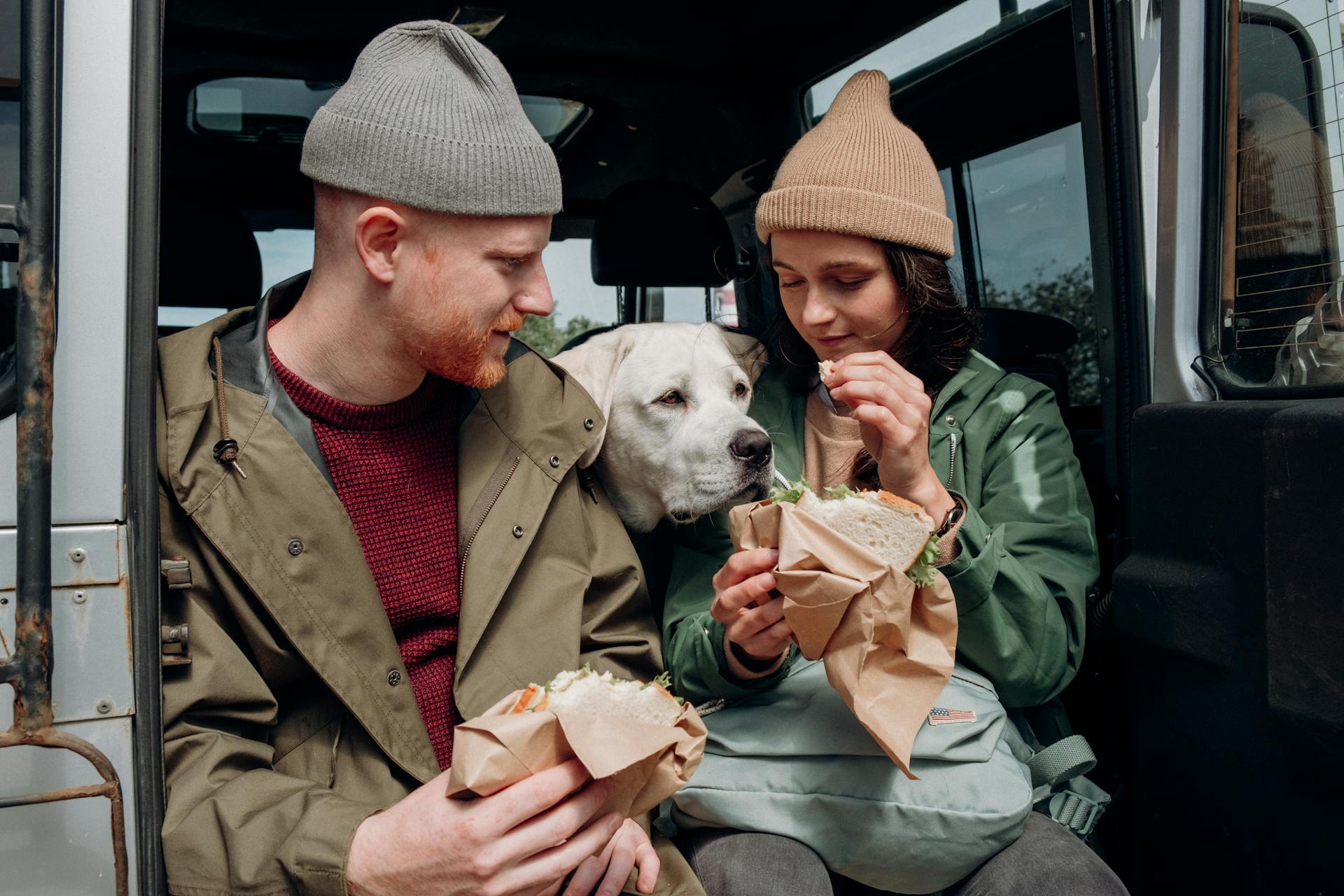
Establishing a consistent routine is essential for mealtime structure. This helps prevent picky eating behaviors and ensures your Toy Poodle gets the food they need when they need it.
Here are some key behavioral factors to consider:
- Activity Level: Generally high, influences diet
- Picky Eaters: May need tailored food choices
- Routine: Essential for mealtime structure
Common Questions
Feeding toy poodle puppies requires a careful approach to ensure their dietary needs are met while avoiding common issues.
Toy poodle puppies have small stomachs and need to be fed frequently to prevent overeating and digestive problems.
Feeding toy poodle puppies requires a nutrient-rich diet that includes protein, fat, carbohydrates, vitamins, and minerals.
Toy poodle puppies need to be fed a high-quality puppy food that is specifically formulated for small breeds.
Puppies need to be fed 3-4 times a day until they are six months old, after which they can be switched to twice a day.
Feeding toy poodle puppies can be challenging due to their finicky eating habits and potential for picky eating.
Toy poodle puppies can be prone to hypoglycemia, a condition caused by low blood sugar, if they don't eat frequently enough.
Feeding toy poodle puppies requires a commitment to providing a consistent and balanced diet.
Toy poodle puppies need access to fresh water at all times to stay hydrated.
Understanding and Calculating
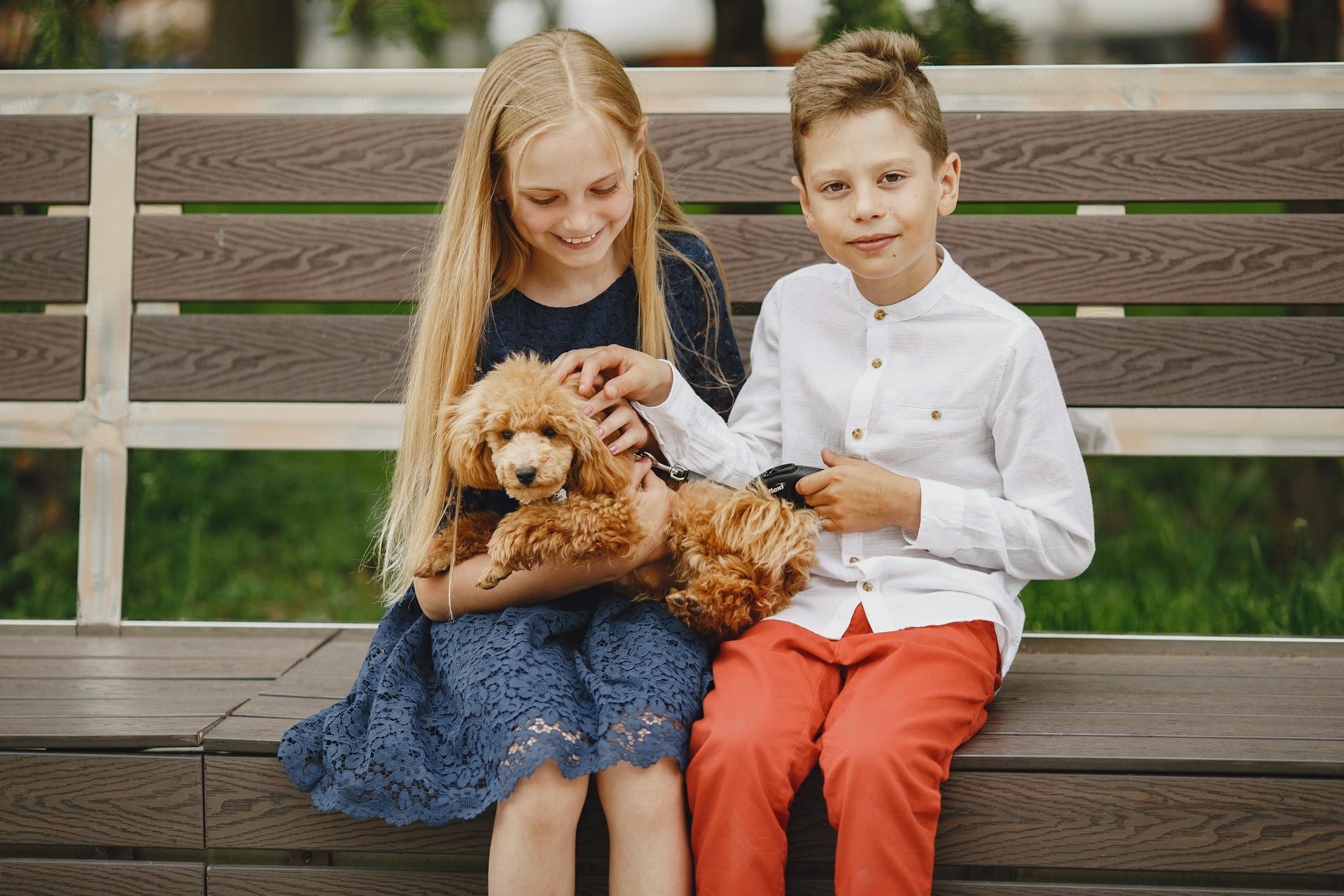
Toy Poodles are a small breed with specific needs that vary across their life stages, requiring particular health considerations and unique behavioral factors.
To calculate the correct portion size for each meal, start by checking the dog food package for the recommended serving size based on weight.
Use a body condition score to adjust if your puppy is more or less active than average.
For toy poodles, 1/2 cup of dry food twice daily is often a good starting point.
An overfed puppy is at risk for obesity, so it's essential to adhere strictly to portion sizes.
To help your puppy feel secure and manage their digestive health, stick to a routine.
Here's a simple guide to get you started:
Remember, every toy poodle is different, so be sure to monitor your puppy's weight and adjust their portion size accordingly.
Frequently Asked Questions
What food is best for Toy Poodles?
For Toy Poodles, high-quality food options include Eukanuba and Wellness, which cater to their specific nutritional needs and promote overall health and well-being. However, it's essential to consult with a veterinarian to determine the best diet for your individual Toy Poodle.
What food can Toy Poodles not eat?
Toy Poodles should avoid toxic foods like chocolate, caffeine, grapes, raisins, onions, garlic, alcohol, and xylitol to prevent serious health issues. Read our Poodle Food Safety Guide for a comprehensive list of foods to keep out of reach
Featured Images: pexels.com
